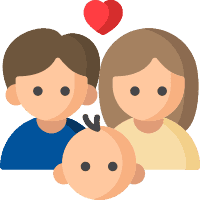[et_pb_section fb_built=”1″ _builder_version=”4.16″ collapsed=”off” global_colors_info=”{}”][et_pb_row _builder_version=”4.16″ background_size=”initial” background_position=”top_left” background_repeat=”repeat” global_colors_info=”{}”][et_pb_column type=”4_4″ _builder_version=”4.16″ custom_padding=”|||” global_colors_info=”{}” custom_padding__hover=”|||”][et_pb_text _builder_version=”4.16″ background_size=”initial” background_position=”top_left” background_repeat=”repeat” global_colors_info=”{}”]
It’s astounding how much your little one develops in the first 12 months of life. By the time their first birthday rolls around, your baby matured from a helpless newborn to a mobile little person with a budding personality. It’s exciting to watch them master new skills and explore their world. Between 6 and 12 months of age, your baby will become increasingly mobile and independent. Here are some one year old baby milestones to watch for in this stage of development. Remember, every kid is unique and grows at their own pace. Your infant might master some of these skills more quickly than others.
Movement, Sensory, and Motor Milestones
During this development stage, it’s time to keep the house baby-proofedand make sure your camera is handy so that you are ready to document milestones and precious moments.
Mobility
Babies usually become very mobile around their first birthday. Your little one should have enough core strength to sit up without any help. They are probably crawling forward on their belly by pulling with their arms and pushing with their legs.
As your infant gains strength and confidence, they should begin to use the traditional crawling position (supporting their weight with their hands and knees under them).
Most kids in this development stage begin to pull themselves up to stand and walk while holding onto your hands, furniture, or other stable objects. You might be celebrating your baby’s first wobbly steps around this age (though many children start walking later).
Sensory and motor skills
Babies should begin to pick up small items (like pieces of food) with their thumb and finger (in a pinching motion). This one year old baby milestone indicates that your child is mastering fine motor skills and beginning to develop fine motor coordination.
It’s exciting to watch infants learn to use everyday objects correctly, like spoons, hairbrushes, and telephones. Their aim might need a little work, but that’s ok!
Healthy play at this stage should stimulate their motor skill development and help them learn about their environment. Most babies seem to enjoy banging two objects together or dumping items into and out of containers.
Containers, wooden spoons, stackable objects (like blocks), and baby toys with different shapes and textures are all excellent, age-appropriate toys.
Kids at this age explore objects by throwing, dropping, banging, and shaking them. You might not enjoy the noise and mess, but they are learning about the world and developing muscle coordination.
Hearing, Language, and Emotional Development
Every baby learns to talk at their own pace. Your baby should be trying to express themselves and interact with you. There are a number of one year old baby milestones in this category that help reveal how your little one is learning to speak, listen, and connect emotionally with people.
Hearing and language development
Infants in this developmental stage should turn and look in the direction of sounds and voices– locating the sound with their eyes. A significant one year baby milestone is whether or not your child responds when you call their name and look where you point.
By the end of 12 months, your baby probably says a few simple words like uh-oh, mama, dada as well as the name of a favorite toy, object, friend or animal. Though their vocabulary is minimal, your little one likely recognizes and understands a lot of words for everyday items like juice, eat, and cup.
Some children begin to follow simple instructions such as come here and put it in the bin.Your little one should start to use gestures as well like waving goodbye, reaching when they want to be picked up, and shaking their head yes and no.
Children at this age usually begin playing speech-language interactive games like peek-a-boo. Games like this help kids learn patterns of interaction (taking turns talking and listening) and engaging in reciprocal exchanges.
Talking to your baby helps expand their vocabulary. Describe what you are doing, where you go, and what you see. Point to things, tell them the name, and praise their efforts to repeat words.
Look at your baby when they make noises and respond in a way that affirms their efforts to communicate. This helps their emotional, social, and language development.
You probably notice your child trying to mimic speech sounds and words. Babies at this age also try to imitate intonation patterns, like raising their voice in a question inflection and shouting to get your attention.
Reading to your child is an excellent way to help their language development.
Social and emotional development
Your child might become shy or anxious around strangers and develop separation anxiety when they are separated from parents, siblings, and other people they know. Allow them time to get used to caregivers before you leave.
Some children might have a favorite toy, stuffie, blanket, or other items. Your baby might also play favorites with people.
As their emotional and social development progresses, your baby’s cooing sounds should start to sound more like babbling or jargonwith multiple syllables. You probably notice their personality and sense of humor starting to emerge.
Some babies begin to resist adult control and display more independent behavior (like wanting to hold their own bottle). They may even start to test your responses to their behavior–what will you do if they cry when you leave the room or refuse to eat a food item?
Feeding?
As your infant becomes more independent, they can participate more in the feeding process.
Being able to hold their own bottle with both hands and beginning to eat various solid foods are significant one year old baby milestones. Your little one should become more tolerant of different textures and tastes. It’s a good idea to introduce new and different age-appropriate foods to encourage healthy eating and a willingness to try new things.
Your infant is probably very interested in tasting whatever they see you eat and drink. You should notice your baby moving their tongue from side to side as they eat and being able to take food off a spoon with their upper lip.
When to be concerned
Every child grows at their own pace. Don’t be alarmed if your little one takes a little longer than other babies to reach these one year old baby milestones. You should speak to your pediatrician or a professional if your child does not reach these benchmarks by their first birthday:
- Crawl
- Stand with help or support
- Say single words (like dada or mama)
- Use simple gestures like pointing, waving or shaking their head yes or no
- Look for objects you hide in front of them
Some babies take a little longer to develop coordination between their left and right side. You should contact a professional if you notice your infant seems weak on one side or tends to drag one side of their body when they crawl for an extended period (more than a month).
The staff at the Center For Speech & Language Development is here to support you and your little one through every stage of development. Our knowledgeable therapists offer a wide range of comprehensive assessments, interventions, and speech, developmental, and nutritional therapies. We provide holistic care to help your child get back on track and ensure parents and caregivers have the right support throughout the process. If you have questions or would like to schedule an appointment, please contact us.
[/et_pb_text][/et_pb_column][/et_pb_row][/et_pb_section]


